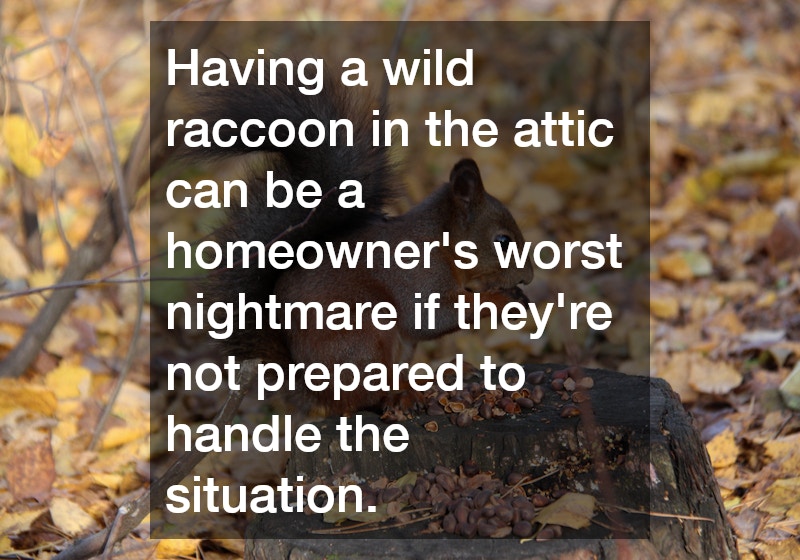
Having a wild raccoon in the attic can be a homeowner’s worst nightmare if they’re not prepared to handle the situation. Concerns about rabies, pests, injury, and damage to your property may all flash through your mind as you panic over what to do about a raccoon that has entered your home.
The first thing you should do when you know or suspect that a raccoon may be in your home is leave the home and call a wildlife removal company after you’ve removed your loved ones and pets from the house. If you’re wondering how you get rid of raccoons on your roof, the process remains largely the same.
As you’ll read in the article below, there are certain ways to handle the situation if you notice signs of a raccoon in the house. After the raccoon is removed, you should address potential raccoon entry points so you’ll never have to search, “Will animal control get rid of raccoons?” on the internet again.
Even if you’ve never had a raccoon in your home, it’s not a bad idea to use the information in this article to prevent raccoon entry. After all, no house is immune to raccoons. Read on to learn more!
When you’re a homeowner, you have many responsibilities. One of those responsibilities is ensuring your attic is accessible from unwanted animal intruders, like raccoons. You might wonder, “How do raccoons get into your attic?” A raccoon is attracted to easily opened garbage cans, , or vegetable gardens. Once raccoons realize they can get regular meals in your yard, they’ll seek a way to enter your home.
Raccoons are nocturnal, so hearing them thumping and chirping at night will be more common. When you discover there is a raccoon in your home, you may wonder how to get raccoons out of the attic. When this occurs, it is safest for you to call a wildlife control company. Those professionals will know how to catch a raccoon in your attic.
The wildlife control specialist will know how to trap a raccoon in the attic. They are trained in how to find raccoons. They will also know how to set a humane trap to contain raccoons and then release them back to their natural setting. They can also let you know how to make changes in the exterior of your home to be sure they don’t crawl back into your home.

Raccoons can be cute in movies and on TV, but they aren’t so adorable when they make their way inside your home. If they find easy access to food and shelter, they’ll move right in and decide to stay — most likely in your attic or another safe, secluded spot. Think these masked intruders have invaded your house? Read on for some answers to your FARQs (that’s frequently asked raccoon questions).
What makes raccoons pick certain homes over others?
The first thing that will attract raccoons and other critters is food availability. Easy-to-open garbage cans, bird feeders, pet feed, or a garden can be your downfall. After the raccoons make sure they can get regular meals, they’ll start looking for openings to your home. They can squeeze through holes as little as four inches or so, which means that a small structural vulnerability is a big deal! They’ll then make their way to your attic, crawl space, chimney, or wall cavity to set up shop and potentially give birth to lots of little raccoons.
How do I know if I have raccoons in my home?
First of all, trust your instincts. If you think there’s an animal living in your house, you’re probably correct. Some pests can be subtle when they enter your home, but raccoons usually aren’t. They often leave scratch marks around house exteriors or even rip through vents. They also make a lot of noise, from thumping and rustling to chirping and crying. Since they’re nocturnal, they’re most active during the night and in the early morning hours. They tend to have a strong odor, too. Therefore, you’ll have to employ at least a few of your five senses to ascertain their presence. Want to have your suspicions confirmed? Call your local animal control company.
Won’t they eventually just leave?
A raccoon family isn’t going to leave your property willingly. They’re intelligent animals who have found a cozy and comfortable place to live! When raccoons take over your home, you’ll need to call a raccoon removal service right away. Not only will they make a huge mess of your home, but they’ll also attract other animals and could even hurt your family. Ignoring their presence will just make the problem worse and may even result in a necessary call for dead animal removal.
What if a raccoon has died in my home or yard?
Even more problematic than live raccoons are ones who have died as a result of disease or injury. If a raccoon dies somewhere on your property, the stench will soon attract other pests and will wreak havoc on your nose. It’s vital to call a dead animal removal expert right away to take care of this problem. And if you’ve dealt with raccoon infestations in the past, you should contact a dead animal removal service that also specializes in wildlife removal. That way, they can determine where animals have found their way in before and can keep it from happening again.
You may think wild animals are darling from a distance, but they’re called “wild” for a reason. When they make their way into your home, they can be a direct threat to your well-being. If you suspect you’re dealing with a pest problem, contact animal control right away.


